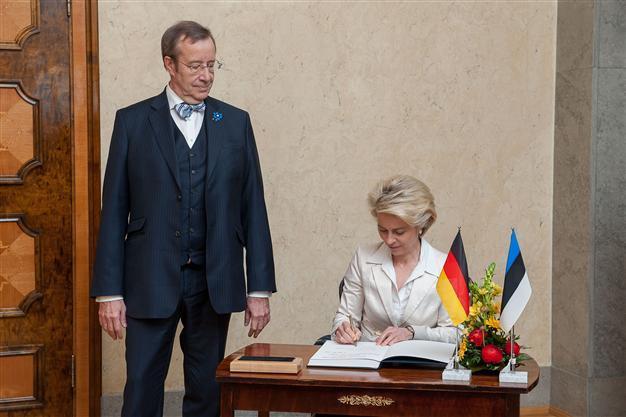Don’t underestimate NATO, German minister says on Baltic visit
TALLINN – Reuters

Estonian President Toomas Hendrik Ilves looks on as German Defence Minister Ursula von der Leyen signs the guest book on April 14, 2015 in Tallinn, Estonia. AFP Photo
Nobody should underestimate NATO’s rapid response capacity, which has been ratcheted up in response to worries about Russia’s military ambitions after its actions in Ukraine, according to Germany’s defense minister.
Ursula von der Leyen said in Russia’s neighbor Estonia, whose president fears the Baltic state could be overrun in hours, that the Western military alliance has demonstrated its determination to defend its eastern flank in recent months.
“Of course the issue of speed and of an adequate response to potential threats plays a major role, and I can only recommend that NATO’s reaction capacity should not be underestimated. It is high,” she told reporters in Tallinn.
“We have shown the necessary adaptability and this is also a reaction to fast exercises we have seen on the other side of the border,” she said, citing plans to boost defenses and build out a new NATO “spearhead” rapid reaction force of 5,000 soldiers.
She was responding to a question about Estonian President Toomas Hendrik Ilves’ comments that while it would take NATO up to a week to deploy to the Baltics, “our neighbor” has shown in exercises that its strike speed is “basically instantaneous.”
“They’re here and it’s over in four hours,” Ilves told the British newspaper The Telegraph in an interview published over the weekend.
NATO, surprised by the speed of Russia’s military intervention in Ukraine’s Crimean peninsula last year, has decided to speed up the response time of its rapid reaction forces.
Its “spearhead” force is unlikely to be fully operational until 2016 or 2017, but NATO has been focusing on its existing reaction force, whose troops are supplied this year by Germany, the Netherlands and Norway.
Some of NATO’s Eastern European allies are disappointed at the U.S.-dominated organization’s reluctance to station large numbers of troops on their territory.
